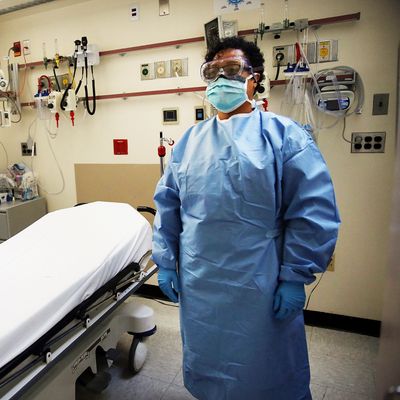
I was working in Sierra Leone with the Peace Corps and later on a USAID project as a consultant. I was supposed to stay on for another year, but then I saw that the Ebola thing was happening. By the end of July, it had just begun to spread; more and more cases were coming, and it was limiting the work I was able to do — USAID wasn’t letting me go to [the affected places]. Obviously, they were concerned about Ebola. And so at that point, I decided that I would not sign another year contract.
I left at the end of July and went back to New York. I was fine for about a week, and then I started getting fevers. And I just thought it was malaria, because I’ve had malaria before. That’s what I assumed it was; that’s what it eventually turned out to be. Around August 3, I was feeling better, so I went out. Then I wasn’t feeling so great, so I came back to my house. I was staying with my mother, and I had like a 104 temperature, so she was obviously freaking out. She called my physician, who happened to be affiliated with Mt. Sinai Hospital. He said that my mom should take me there.
My mom didn’t think it was Ebola, but she took me to the hospital just in case it was. I didn’t want to go, because in the back of my mind, I knew they were going to suspect it was Ebola, just because of circumstances. I told my mom that, too, but she didn’t agree because I had a high temperature and stomach issues. So we had to take a cab up to Mt. Sinai, and they immediately put me in this little isolation room down in the ER. It was only, like, a door that closed.
When I first went on the assignment in April, Ebola was only in the rural parts of Guinea, and it hadn’t yet made its way to Sierra Leone. It wasn’t really on my mind, because Ebola has usually stayed in pretty rural areas. But, I think at the beginning of May, I was actually in that area of Sierra Leone that’s since been really badly hit. I was doing a workshop there, and someone called and said, “I hope you’re not in [that area].” And I said no, I’d actually just traveled out of it. And he said, “Good,” because they’d had a confirmed Ebola patient there. That was one time I’d gone to that part of the country.
When I first arrived at Mt. Sinai, it wasn’t really clear what was going to happen, because I told them it was probably just malaria. So, they were wearing gloves and masks, but they weren’t wearing the full protective gear, because they didn’t think that it was Ebola (not that they would know). It was already early in the morning, so I decided to sleep there and see the infectious-disease doctor later.
When I woke up, I tried to get up and leave and go to the bathroom, and they locked the door and wouldn’t let me out, so I knew something was up. The chief of the ER came in and told me that there was good news: The test for malaria came back negative. The bad news was that they had to test me for Ebola. They had to send my blood down to the CDC.
At that point, they told me they were going to transfer me to the ICU isolation room, which is more like a decompression chamber. Then they started getting more serious. No one would come in unless they were wearing one of those full-protection suits. They lined all the halls with people in suits, just to make sure no one would come in contact with me, and whisked me upstairs to this room.
I still wasn’t feeling very well, so I was resting and thinking back to my last few days in Africa and whether I had come in contact with anyone who was that sick. Because I couldn’t really think of anyone, I was pretty confident that it was not going to be Ebola. Plus, the fact that it had been over two weeks, and usually if you’re gonna get Ebola, the symptoms would show [earlier].
The doctors at Mt. Sinai were saying the same thing, too, but they also said that they couldn’t rule it out. So I pretty much just had to be isolated for a few days while they got the test back. That took [about three days], because I think they didn’t know how to get my blood to [the CDC lab in Atlanta]. They tried to send it via FedEx, but FedEx wouldn’t accept it. They tried to have someone board a plane with it, and Delta wouldn’t let them on the plane. I think they just had to charter a plane, just with my blood. It was pretty funny. I’ve never been on a chartered plane, but a part of me has.
My mom was pretty freaked out. They told her just to close my room and not let anyone inside it, and also to keep monitoring her own temperature. I had my phone, so I could talk to her. I was trying to tell her it was going to be all right.
After a few days, I was doing better, so I just wanted to get out of there. It was unclear whether we were going to get the results that afternoon or the next morning, so I was just kind of sitting around, with all these IVs and monitors on me. It was really annoying.
When the head of the ICU and the president of the hospital walked in and weren’t wearing protective gear, I knew for sure that I didn’t have Ebola. I left like ten minutes later.





























